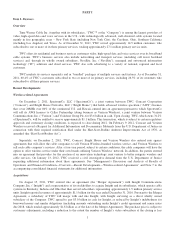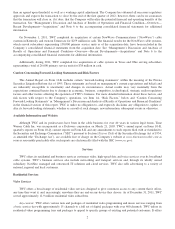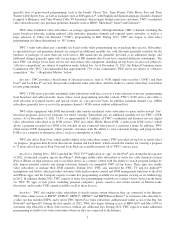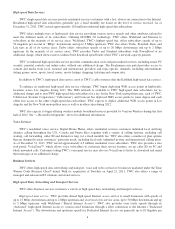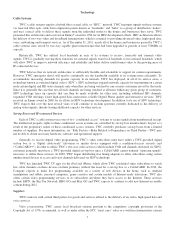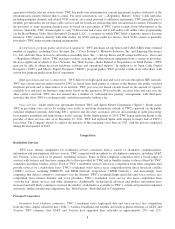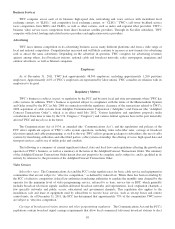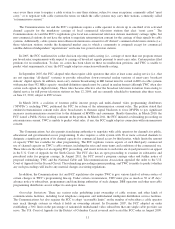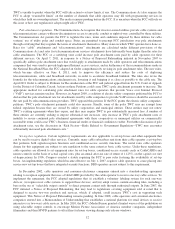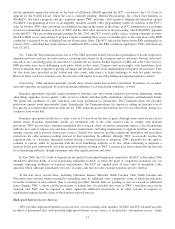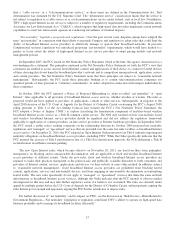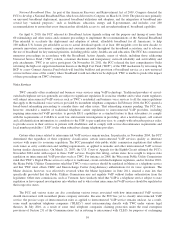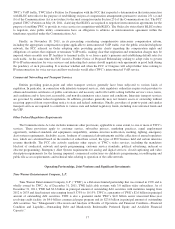Time Warner Cable 2011 Annual Report Download - page 19
Download and view the complete annual report
Please find page 19 of the 2011 Time Warner Cable annual report below. You can navigate through the pages in the report by either clicking on the pages listed below, or by using the keyword search tool below to find specific information within the annual report.once every three years to require a cable system to carry their stations, subject to some exceptions, commonly called “must
carry,” or to negotiate with cable systems the terms on which the cable systems may carry their stations, commonly called
“retransmission consent.”
The Communications Act and the FCC’s regulations require a cable operator to devote up to one-third of its activated
channel capacity for the mandatory carriage of local commercial television stations that elect “must carry.” The
Communications Act and the FCC’s regulations give local non-commercial television stations mandatory carriage rights, but
non-commercial stations do not have the option to negotiate retransmission consent for the carriage of their signals by cable
systems. Additionally, cable systems must obtain retransmission consent for all “distant” commercial television stations (i.e.,
those television stations outside the designated market area to which a community is assigned) except for commercial
satellite-delivered independent “superstations” and some low-power television stations.
In 2005, the FCC reaffirmed its earlier decision rejecting multi-casting (i.e., carriage of more than one program stream
per broadcaster) requirements with respect to carriage of broadcast signals pursuant to must-carry rules. Certain parties filed
petitions for reconsideration. To date, no action has been taken on these reconsideration petitions, and TWC is unable to
predict what requirements, if any, the FCC might adopt in connection with multi-casting.
In September 2007, the FCC adopted rules that require cable operators that offer at least some analog service (i.e., that
are not operating “all-digital” systems) to provide subscribers down-converted analog versions of must-carry broadcast
stations’ digital signals. In addition, must-carry stations broadcasting in HD format must be carried in HD on cable systems
with greater than 552 MHz capacity; standard-definition signals must be carried in analog format (although TWC often also
carries such signals in digital format). These rules became effective after the broadcast television transition from analog to
digital service for full power television stations on June 12, 2009, and are currently scheduled to terminate after three years,
on June 12, 2012, subject to FCC review.
In March 2010, a coalition of fourteen public interest groups and multi-channel video programming distributors
(“MVPDs”), including TWC, petitioned the FCC for reform of the retransmission consent rules. The petition stated that
outdated retransmission consent rules allow broadcasters to threaten signal blackouts to force MVPDs to pay significant
increases in retransmission consent fees to the detriment of MVPDs and consumers. Shortly thereafter, in March 2010, the
FCC issued a Public Notice seeking comment on the petition. In March 2011, the FCC initiated a rulemaking proceeding on
retransmission consent. TWC is unable to predict what rules, if any, the FCC might adopt in connection with retransmission
consent.
The Communications Act also permits franchising authorities to negotiate with cable operators for channels for public,
educational and governmental access programming. It also requires a cable system with 36 or more activated channels to
designate a significant portion of its channel capacity for commercial leased access by third parties, which limits the amount
of capacity TWC has available for other programming. The FCC regulates various aspects of such third-party commercial
use of channel capacity on TWC’s cable systems, including the rates and some terms and conditions of the commercial use.
These rules are the subject of an ongoing FCC proceeding, and recent revisions to such rules are stayed pursuant to an appeal
in the U.S. Court of Appeals for the Sixth Circuit. The FCC also has an open proceeding to examine its substantive and
procedural rules for program carriage. In August 2011, the FCC issued a program carriage order and further notice of
proposed rulemaking. TWC and the National Cable and Telecommunications Association appealed the order to the U.S.
Court of Appeals for the Second Circuit. The rulemaking proceeding remains pending, and TWC is unable to predict whether
any such proceedings will lead to any material changes in existing regulations.
In addition, the Communications Act and FCC regulations also require TWC to give various kinds of advance notice of
certain changes in TWC’s programming line-up. Under certain circumstances, TWC must give as much as 30 or 45 days’
advance notice to subscribers, programmers and franchising authorities of such changes. DBS operators and other non-cable
programming distributors are not subject to analogous duties.
Ownership limitations. There are various rules prohibiting joint ownership of cable systems and other kinds of
communications facilities, including local telephone companies and multichannel multipoint distribution service facilities.
The Communications Act also requires the FCC to adopt “reasonable limits” on the number of subscribers a cable operator
may reach through systems in which it holds an ownership interest. In December 2007, the FCC adopted an order
establishing a 30% limit on the percentage of nationwide multichannel video subscribers that any single cable provider can
serve. The U.S. Court of Appeals for the District of Columbia Circuit reversed and vacated the FCC order in August 2009.
11


